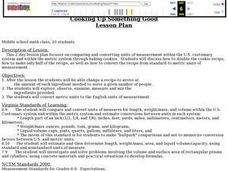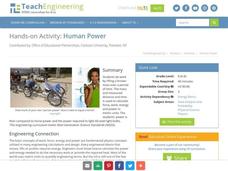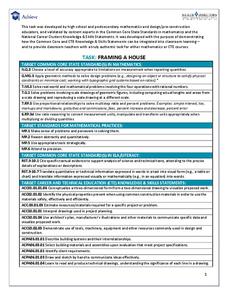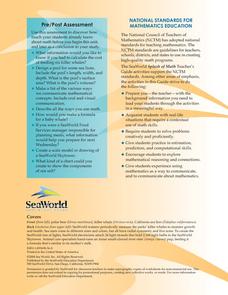Curated OER
Metric Measurement Conversion
In this metric conversion learning exercise, students write equivalent measures for given problems, 21 total. Worksheet contains links to additional activities.
Curated OER
Cooking Up Something Good
Students compare and convert units of measurement within the United States customary system and within the metric system by baking cookies. Students discuss how to double the cookie recipe, how to make only half of the recipe, and how to...
Alabama Learning Exchange
Sky High
How are skyscrapers built? What does it take to make a structurally sound building? How can one work within a budget to complete a building project? These guiding questions will be investigated and answered within a hands-on lesson....
University of Colorado
Are All Asteroids' Surfaces the Same Age?
Did you know scientists can tell the age of an asteroid by looking closely at its craters? This final lesson of a six-part series focuses on two asteroids, Gaspra and Ida, in order to demonstrate the concept of dating asteroids. Scholars...
Teach Engineering
What's Wrong with the Coordinates at the North Pole?
Here is an activity that merges technology with life skills as individuals use Google Earth to explore the differences between coordinate systems and map projections. The self-guided worksheet is the fourth segment in a nine-part unit....
Noyce Foundation
Ducklings
The class gets their mean and median all in a row with an assessment task that uses a population of ducklings to work with data displays and measures of central tendency. Pupils create a frequency chart and calculate the mean and median....
Curated OER
US City Quality of Life Analysis and Comparison
Learners analyze US census data and criteria to compare and measure the quality of life in the country's fifty largest cities. After accessing the 2005 quality of life world report online, students conduct their study to compare three...
Curated OER
Exploring Geometric Figures
Tenth graders explore mathematics by participating in hands-on daily activities. Learners identify a list of different shapes and classify them by shape, size, sides and vertices. They utilize tangrams and geometric pieces to gain...
Curated OER
Temperature and Thermal Energy
Examine how heat can be transferred between systems by reconstructing a diagram on energy flow and solving problems on heat flow and work done.
University of Colorado
Are All Asteroids' Surfaces the Same Age?
There are more than 600,000 asteroids in our solar system. Pupils analyze images of two asteroids in order to determine if they are the same age. They count craters for each asteroid and compare numbers.
Teach Engineering
Human Power
How many humans does it take to power a light bulb? The 10th part of a 25-lesson Energy Systems and Solutions unit has learners conduct an experiment to calculate power. They then use the results to determine how many classmates they...
National Institute of Open Schooling
Mole Concept
Learners explore atomic measurement in the first activity in a series of 36. Through readings, activities, and questions, classes review standard SI units, learn about Avogadro's constant, and use it to help them calculate moles. They...
NASA
Cleaning Water
Give young scientists a new appreciation of fresh, clean drinking water. After learning about the ways astronauts recycle their air and water, your class will work in small groups creating and testing their very own water...
Cornell University
Splitting Water with Electricity
Explore how electricity splits water molecules into hydrogen and oxygen. Learners begin by calculating the voltage necessary to separate the water. They then perform the experiment and measure the ratio of hydrogen and oxygen bubbles.
Teach Engineering
Air Under Pressure
Introduce your class to air masses and how they affect the weather with a lesson that focuses on the differences between high and low air pressure systems. The class explores actual weather data using archived weather data.
NASA
Supernova Chemistry
By measuring the wavelength, frequency, and intensity of electromagnetic radiation, scientists determine the temperature, density, and composition of far away items. Scholars rotate through ten lab stations using a spectroscope at each...
Geophysical Institute
Latitude and Longitude with Google Earth
Travel the world from the comfort of your classroom with a lesson that features Google Earth. High schoolers follow a series of steps to locate places all over the earth with sets of coordinates. Additionally, they measure the distance...
Achieve
Framing a House
If members of your class wonder where they can use the math they learn in middle school, let them discover the answer. Learners apply geometry concepts of scale and measure to calculate the costs of framing a house addition.
University of Georgia
The Power of Peanuts
Measure the amount of energy in a peanut by igniting a chemical reaction. Classes use a laboratory setup to burn a peanut and measure the amount of heat it releases through a temperature analysis. They calculate the number of Joules of...
Curated OER
Changing Planet: Melting Glaciers
Resource links to a video, satellite images, data, and photographs of glaciers provide emerging earth scientists the opportunity to examine how the ice has been retreating over the years. A data table is included for pupils to record...
Teach Engineering
Flow Rates of Faucets and Rivers
Go with the flow and use a helpful resource. A set of two activities has learners investigate flow rates. They first determine the flow rate of a faucet by measuring how long it takes to fill a bucket. Using the results, they make a...
Code.org
Bytes and File Sizes
A bite of bits. The first instructional activity in a unit of 15 introduces the class to the byte. Pupils learn about other standard units for measuring file sizes, develop an understanding of relative sizes and the kind of units...
Teach Engineering
Exploring Bone Mineral Density
Bone up on bone density. The second installment of the seven-part series has pupils read articles on two different websites to learn about bone density and its measurement, as well as X-rays and other imaging tools. A quiz assesses their...
Sea World
Splash of Math
How can kids use math to learn about marine life? Combine math skills with science lessons in a resource featuring activities about life in the sea. Kids graph and calculate data, solve complex word problems, measure geometric shapes,...























